|
|
|
Sort Order |
|
|
|
Items / Page
|
|
|
|
|
|
|
| Srl | Item |
| 1 |
ID:
102016
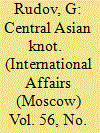

|
|
|
|
|
| Publication |
2010.
|
| Summary/Abstract |
THROUGHOUT ITS HISTORY, Russia has been geopolitically and geostrategically bound to Central Asia. Our ancestors understood this very well and regarded the Asian underbelly as the Russian Empire's buffer in the southeast. During Soviet times, this region turned from an important entity of foreign political interests into an integral part of the superpower.
|
|
|
|
|
|
|
|
|
|
|
|
|
|
|
|
| 2 |
ID:
141937
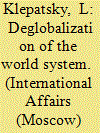

|
|
|
|
|
| Summary/Abstract |
THE PRESENT transitory post-bipolar world system manifests several trends: globalization, transformation of international relations, gradual shift toward a multipolar world and the emergence of new centers of a future world order. These and other trends of the transitory period have been exhaustively described in academic and political writings. The sum-total of factors responsible for the essence and the far from simple nature of current transformations require further specification and even more comprehensive analysis. The polycentric nature of international relations is not a recent phenomenon yet the present stage of its development goes to the depths where the so far practically indiscernible elements of a future world order are taking shape. The transitory period of the post-bipolar world has not yet ended. The theory of international relations has no use for the "transitory period" category and its highly specific historical content: Indeed, the bipolar world system took some time to develop after 1945. The transitory period is characterized by an intertwining of old and new elements and factors that, on the one hand, ensures continuity of international relations and, on the other, creates the outlines (configuration) of a new world order.
|
|
|
|
|
|
|
|
|
|
|
|
|
|
|
|
| 3 |
ID:
142134
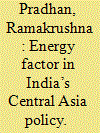

|
|
|
|
|
| Summary/Abstract |
India’s broader foreign policy benefits its energy outreach policies and particularly from the overseas investments of its national companies. From the energy outreach point by going with the maxim of C. Raja Mohan India’s foreign policy strategy divides the world into three concentric circles – immediate neighbourhood, extended neighbour and global stage. Energy interests of India helped her to promote her interests in each of these circles. The benefits of India are particularly clear in the Persian Gulf, Russia and Africa. At the Central Asian front India has a tag of late comer and slow starter. It seems a quite disinterested power in the region. Its disparate policies need reform and strategies need reintegration with the backing of economic muscle and political willpower if India wants to play a decisive role in the region. The July, 2015 visit of Indian Prime Minister Mr. Modi is a positive step in this direction. During this visit New Delhi has signed several bilateral energy agreements with the Central Asian Republics and has paved a way forward for positive engagement with both the regions.
|
|
|
|
|
|
|
|
|
|
|
|
|
|
|
|
| 4 |
ID:
112150
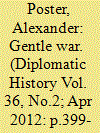

|
|
|
|
|
| Publication |
2012.
|
| Summary/Abstract |
Alexander Poster's article, "The Gentle War: Famine Relief, Politics, and Privatization in Ethiopia-1983-1986" examines the Reagan administration's efforts to resolve Cold War disputes through humanitarian assistance. With the Vietnam War fresh in minds of both Congress and the American public, Reagan officials dealt with hesitancy when they pressed for military and developmental grants for foreign nations. M. Peter McPherson, administrator for the Agency for International Development, discovered a solution to the Reagan administration's problem. McPherson noted that Americans still supported humanitarian objectives abroad and sought to incorporate humanitarian relief into President Reagan's foreign policy strategy. The Ethiopian famine of the mid-1980s resulted in the largest mobilization of relief resources in U.S. history. The American response was both a humanitarian effort and a targeted attempt to discredit socialist dictator Mengistu Haile Mariam. American policymakers drew up their policy with the intent to strengthen rebel areas, discourage collectivization of land, and take credit for most of the relief effort. Thus, disaster relief in Ethiopia served a dual purpose: to provide humanitarian aid and to further American security interests.
|
|
|
|
|
|
|
|
|
|
|
|
|
|
|
|
| 5 |
ID:
137303
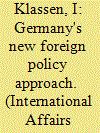

|
|
|
|
|
| Summary/Abstract |
THE 50TH MUNICH SECURITY CONFERENCE heard vague hints from the new governing coalition about a significant evolutionary change in Federal Germany's foreign policy strategy. Germany's Foreign Minister Frank-Walter Steinmeier said that his country "must be ready for earlier, more decisive and more substantive engagement in the foreign and security policy sphere.
|
|
|
|
|
|
|
|
|
|
|
|
|
|
|
|
| 6 |
ID:
157262
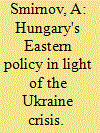

|
|
|
|
|
| Summary/Abstract |
THE ONGOING UKRAINE CRISIS has been a harsh trial for Russia and the European Union; it has been especially painful for countries that recently became members of a united Europe. The reasons for this are their territorial proximity to a hotbed of tension and their special historical relation to Ukrainian affairs. This is especially true for Ukraine's immediate Western neighbors: Hungary, Poland, Slovakia, and Romania. Their attitude to the situation is in one way or another associated with the problem of Ukrainian sovereignty, as it is understood and perceived by the government of each country.
|
|
|
|
|
|
|
|
|
|
|
|
|
|
|
|
| 7 |
ID:
174443
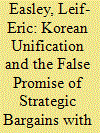

|
|
|
| 8 |
ID:
141596
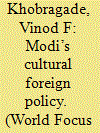

|
|
|
|
|
| Summary/Abstract |
The Culture, Values and Ideas play major role in the foreign policy of the states. The culture has no boundaries and is transformed to win over the hearts of the people around the world. The Cultural diplomacy is a very important means of foreign policy of the country to promote the International linkages. In other words, the cultural diplomacy helps in bringing cordial and hearty relations amongst the people across the world. Cultural diplomacy is seen in terms of ‘Soft Power’, the term which was coined and popularized by Joseph Nye to describe the US’s foreign policy strategy.
|
|
|
|
|
|
|
|
|
|
|
|
|
|
|
|
| 9 |
ID:
185528
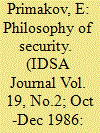

|
|
|
| 10 |
ID:
151594
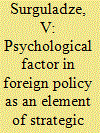

|
|
|
|
|
| Summary/Abstract |
NORMALLY, the military, political, economic and social factors are fairly obvious and, therefore, are treated as the key objects of situational analysis and political science assessments in foreign policy planning and forcasting. On the other hand, values, ideologies, political will, and motivations require special attention as the factors the vagueness of which is created by considerable cultural distinctions, specifics of outlooks and self-awareness of different people living in different states.
|
|
|
|
|
|
|
|
|
|
|
|
|
|
|
|
| 11 |
ID:
148345
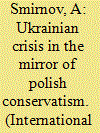

|
|
|
|
|
| Summary/Abstract |
MANY EUROPEAN STATES recognized the Ukrainian crisis as a serious reason to revise their political opinions and change the balance of power. For historical reasons and due to the sharpening struggle between the main political forces inside the state, Poland is involved in the process to a much greater extent than its East European neighbors. To the last moment, the right-wing conservatives remained in determined opposition to the policies of the liberal forces that for a long time controlled the Polish political Olympus practically unhampered. The victory of the conservative Law and Justice Party (PiS) at the 2015 presidential elections added urgency to the problem of the Polish-Ukrainian political interaction.
|
|
|
|
|
|
|
|
|
|
|
|
|
|
|
|
| 12 |
ID:
179800


|
|
|
|
|
| Summary/Abstract |
This article tackles the question of whether US President Donald Trump’s foreign policy is informed by doctrine and, if so, what that doctrine is. In doing so, it positions itself with those who argue for the presence of a doctrine and specifically those who argue for a doctrine of unpredictability. The article problematises current understandings of doctrine, and the notion of unpredictability itself. The tendency to rely on the rational decision-making model is identified as a hindrance to analysis that acknowledges the possibility of a doctrine premised on a deliberate strategy of obfuscation and of wrongfooting both friend and foe. A four-pronged model of unpredictability is posited, consisting of inconstancy, inconsistency, unconstrainedness, and unreliability. This model encourages research unimpeded by prior ideas that treat Western foreign policy as rational and therefore expands the range of possible foreign policy doctrines that analysts contemplate.
|
|
|
|
|
|
|
|
|
|
|
|
|
|
|
|
|
|
|
|
|